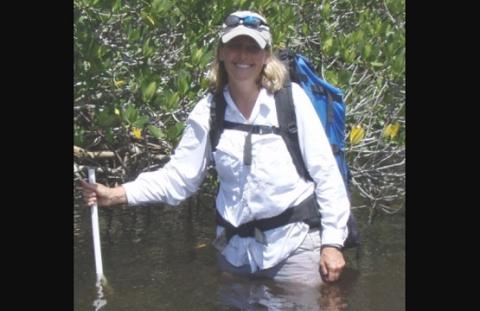
Gulf Ecology Division (EPA)
Always stay curious, ask lots of questions, and make sure your college professors know you.
Education
- B.S., Biology, Mary Washington College
- M.S., Marine Science, Virginia Institute of Marine Science, College of William and Mary
- Ph.D., Marine Science, Virginia Institute of Marine Science, College of William and Mary
Salary
$60,000 - $80,000
Contact
What is your current job and what does it entail?
I am a research ecologist in the U.S. Environmental Protection Agency's Office of Research and Development at the Gulf Ecology Division. I work on a variety of projects including research to support the Sustainable and Healthy Communities Program and the National Wetlands Condition Assessment. We are currently ramping up a project that will use Sediment Profile Imaging (SPI) to examine the impact of nutrient and dissolved oxygen dynamics on the condition and function of benthic habitats in Gulf Coast estuaries.
What was the key factor in your career decision?
I think I was at the right place at the right time. I went to graduate school without funding and had every intention of studying fish and living off of what little savings I had until I could land a grant or contract to support my studies. Instead, I was hired as a worm-picker by my soon-to-be advisor at the graduate student welcoming picnic on my first day at VIMS (Virginia Institute of Marine Science). He needed someone to help process samples for a project looking at benthic communities on the continental slope off of North Carolina and I needed the money. I had no idea at the time that worms could be so cool and that you could learn so much about a system by looking at the critters that live in the mud. I was instantly hooked. Much of my graduate school advisor's research was very applied and often funded by the federal government, so those were the types of projects I helped out on when I was in graduate school. I think these experiences helped me to get a better understanding of how research is done to meet specific programmatic needs and probably eventually helped me when I was first hired as a post-doc at the EPA.
What do like most about your career?
I like the variety of projects and the opportunity to apply what I know to address new questions or issues. As a government scientist, my research focus often changes to meet the latest program priorities and needs. While this can sometimes be challenging because I feel like I am pushed a little out of my "comfort zone," in the end it is rewarding because I am always learning new things and making a difference in protecting our environment.
What do you like least about your career?
Even though there is a great deal of variety in the projects that I work on as a government scientist, the scope of those projects can be limited. Also, working in a variety of projects can be a double-edged sword. While it is exciting to venture into new subject areas, just when you get comfortable with that new topic, it may be time to change focus again. It also takes a long time to do things when you work for the government.
What do you do to relax?
Since most of my time at the office is spent inside working at my computer or in meetings, I try to get outside as much as possible during my free time. I enjoy spending a weekend afternoon pulling weeds in my garden, swimming at the beach, or going on long walks in my neighborhood with my dog.
Who are your heroes/heroines?
There are a lot of people that I admire for different reasons but I think my teachers and professors who challenged me and encouraged me to ask questions have had the biggest influence on my professional life.
What advice would you give a student who expressed an interest in pursuing a career in your field?
Jump at chances to do internships or volunteer in research labs to explore different aspects of science that interest you. Look for opportunities in your hometown, as well as those in far-away places. Travel will give you new and refreshing perspectives on things and you are sure to come home with some really good stories. Try new things. Something that may not have even been on your radar as something of interest may turn into your life-long passion if you just give it a chance (that's how I ended up being a benthic ecologist!). Always stay curious, ask lots of questions, and make sure your college professors know you so they can write letters of recommendation tailored for you for your graduate school applications (so make going to graduate school part of your career plan).
Are career opportunities in your field increasing or decreasing and why?
I believe opportunities to work in the environmental sciences and support the development of regulations that protect it will increase as our population continues to move toward the coasts and we try to figure out ways to make sustainable land use and community decisions. The availability of opportunities for new people to work specifically for the federal government seems to vary from year to year with funding levels, but there will always be a need for smart people to help the agency address the next environmental problems facing our nation and the world.
What will you be doing 10 years from today?
I would like to be doing the same kind of work I'm doing today, but integrating more new technologies that are developed between now and then.

